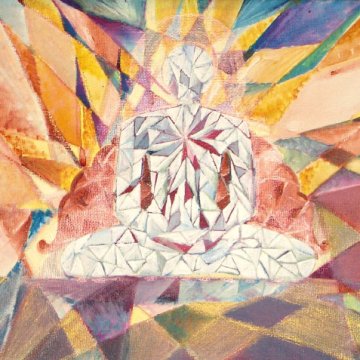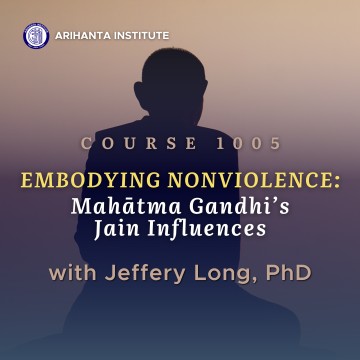Embodying Nonviolence: Mahātma Gandhi’s Jain Influences
Course Intro Video


Embodying Nonviolence: Mahātma Gandhi’s Jain Influences
Course 1005
Mohandas K. Gandhi (1869-1948) is well known as the leader of India’s nonviolent struggle for independence from the British Empire. What is less well known is the great variety of traditions that went into making up Gandhi’s philosophy. These traditions include the Vaiṣṇava Hindu tradition in which he was born and raised, as well as the Jain tradition, a prominent tradition of his native state of Gujarat, which had a profound impact on his worldview and his advocacy of ahiṃsā–non-violence in thought, word, and action–in all aspects of life. This course will explore the considerable impact of Jain thought and practice on Mohandas Gandhi, and the role of the Jain tradition in his path to becoming the Mahātma: the great soul who has inspired generations not only of Indians, but of people around the world who yearn for the nonviolent transformation of global society. Of particular interest will be the teachings of Gandhiji’s Jain guru, Sri Rajchandra Mehta (1867-1901).
Course Length
20 HoursCourse Details
• 20-hour self-study course.• Additional readings offered as support material.
• Professor available by appointment.
Learning Area
 Jain Philosophy, History & Anthropology
Jain Philosophy, History & Anthropology Instructor
 Jeffery Long, PhD
Jeffery Long, PhD
Dr. Jeffery D. Long is the Carl W. Zeigler Professor of Religion, Philosophy, and Asian Studies at Elizabethtown College, in Elizabethtown, Pennsylvania, where he has taught since receiving his PhD from the University of Chicago Divinity School in the year 2000. He is the author, editor, or co-editor of twelve books, including Hinduism in America: A Convergence of Worlds, which won the Rajinder and Jyoti Gandhi Award for Excellence in Theology, Philosophy, and Critical Reflection from the Dharma Academy of North America in 2022. His latest book is Discovering Indian Philosophy: An Introduction to Hindu, Jain, and Buddhist Thought. His work focuses primarily on the religions and philosophies of India, mainly the Hindu, Jain, and Buddhist traditions, and on such themes as nonviolence, pluralism and its metaphysical foundations, the pedagogy of teaching Indic traditions in a Western context, religion and popular culture, and the concept of rebirth. In 2021, he received an award from the International Ahimsa Foundation for his efforts to promote nonviolence through scholarship. In the same year, he received the Ranck Award for Research Excellence from Elizabethtown College. He has spoken three times at the United Nations and appears in documentaries for PBS and the History Channel.
Enrollment Options
14-DAY FREE TRIAL
- Free, unlimited access to our self-paced courses for 14-days.
- Already used your free trial? Enroll in our Monthly or Annual Membership options at anytime and continue learning immediately!
MONTHLY MEMBERSHIP
- $45 USD / Month
-
Immediate access to course
#### | Name. - Unlimited access to our live and self-paced courses for one month, with month-to-month auto rollover.
- Excludes graduate seminars, language courses, and courses hosted on partner platforms.

